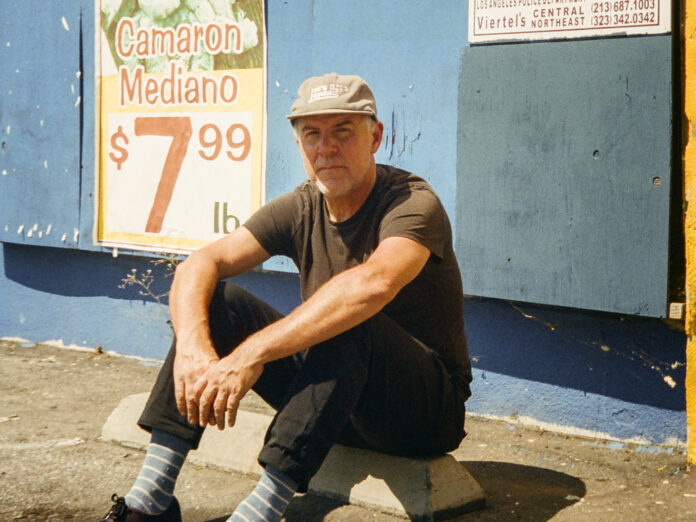The great gift of Grandaddy records has always been their ability to immerse the listener in a distinct musical landscape. The small-city drift of Under The Western Freeway, the humidity of 2000’s The Sophtware Slump.
The great gift of Grandaddy records has always been their ability to immerse the listener in a distinct musical landscape. The small-city drift of Under The Western Freeway, the humidity of 2000’s The Sophtware Slump.
TALKING HEADS ARE ON THE COVER OF THE NEW UNCUT – HAVE A COPY SENT STRAIGHT TO YOUR HOME
The band’s sixth studio album belongs to somewhere new again: in part rooted in Modesto, the California city where songwriter Jason Lytle was raised, and to where he returned in 2016, setting up a home studio. It belongs, too, to neighbouring Nevada, where in recent years Lytle has liked to take long desert drives. And in some way it is a record of Tennessee – on one of his roadtrips, Lytle having heard Patti Page’s 1950 recording “Tennessee Waltz” spilling out of the car radio, and wondering whether maybe heartbreak didn’t sound something like pedal steel.
Various heartbreaks run through Blu Wav. Not least the loss of long-term Grandaddy member Kevin Garcia, who died suddenly of a stroke in 2017. Garcia’s passing was the latest downswing in the life of a band that had often been unsettled, and was sometimes barely a band at all. Formed in 1996, and often touted as America’s answer to Radiohead, Grandaddy spun a kind of warm, witty space rock chronicling the melancholy meet-cute between mankind and the natural world.
For a time they seemed destined for immense success, but despite touring extensively and enjoying critical success, the rock’n’roll life proved too unwieldy, too mentally draining, too financially precarious, and the band broke up in 2005. A later reformation brought the post-divorce record Last Place, but came to an abrupt halt with the death of Garcia two months later. None of this – the loss of a friend, the end of a band, appears to be addressed directly on Blu Wav, and yet it runs beneath these songs like a strange kind of undertow.
More directly, these are songs of romantic break-up and disenchantment, storytelling sometimes, autobiography the next: an outdoorsy sort acknowledges the inevitable failure of his relationship with an office worker in the exquisite “Watercooler”; a jealous lover haunts his ex via their favourite songs on “Jukebox App”; and a far-flung suitor drifts into deep longing on the bittersweet “On A Train Or Bus”. All tell stories of love at a remove – protagonists out of time or physically apart – and these intimate emotional gulfs help to underscore the sense of space that has long characterised Grandaddy’s music; a vastness that somehow sweeps together the American landscape, cyberspace and great expanses of feeling.
“Ducky, Boris And Dart” is more tangential – named for three departed animals, a kitten, a bird and a cat, and at first sounding little more than a dusty, sweet ditty, it manages to serve as a tribute to all losses, drawing the ear back, looping it around and burrowing deep. It’s too categorical to call this a song for Garcia, but it’s hard not to wonder as Lytle sings the song’s refrain: “Well thank you my friend, but this ain’t the end/We will meet again”.
Lytle made this record pretty much solo, though in the story of Grandaddy this has often been the case; the songs unspooling from him, and for the most part set down by him, too. This has allowed the band to establish a particular sonic signature in which the pastoral meets with technological twists and buffers Lytle’s dusky falsetto. Blu Wav’s title nods to an unexpected intersection between bluegrass and new wave, and the songs here do meet that brief: they sound both heartfelt and hardwired, simple and lilting tunes encounter electronics and overdubs, found sounds, recordings made at the local Guitar Center, and tapings of coyotes in Los Angeles.
Lytle has noted that seven out of the album’s 13 songs are waltzes, and that there is “an inordinate amount of pedal steel” to boot. It’s the first time Grandaddy have in any way rooted themselves in a specific genre, and it proves strikingly successful; Lytle’s more experimental electronica pushing against any notion of nostalgia or country pastiche. It’s not unfamiliar territory – a fine recent companion to Blu Wav might be Angel Olsen’s Big Time, which also reckoned with loss via a contemporary take on country music. Lytle similarly takes distinct musical touchstones, those waltzes and pedal-steel quivers, pairs them with some of the iconography of Americana, cabins, jukeboxes, barrooms, and wraps them in synths and compressors and pre-amps.
The effect is to send the listener into a kind of emotional, geographical and chronological freefall, as if we might be passing through any decade, state or era in recent American history. A little lost, a little lovelorn, in hope of a place to land.



